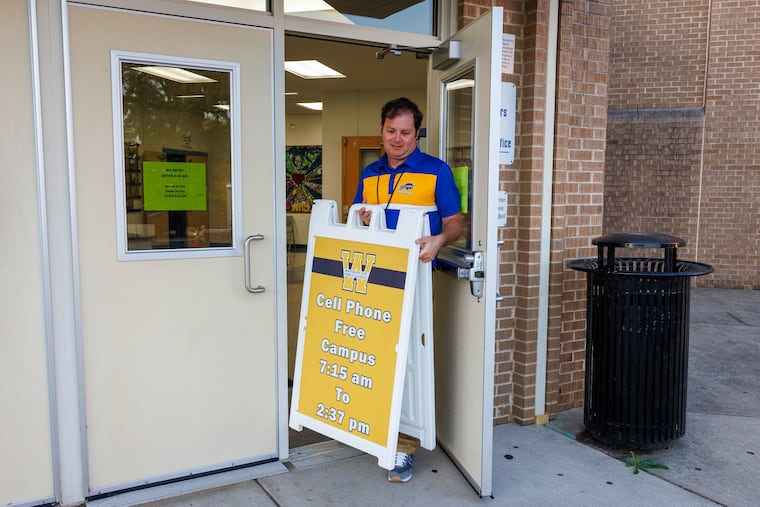Should New Jersey public schools restrict cell phones during class? A bill would require schools to create their own policies.
The bill thrusts New Jersey into a growing national movement by some schools to implement cell phone bans or restrictions to ease classroom distractions.

New Jersey schools may be required to develop policies to limit students from using cell phones and electronic devices during class.
A bill introduced by State Sen. Paul Moriarty (D., Gloucester) would require the New Jersey Department of Education to help K-12 schools develop policies to prohibit students from using the devices during instruction.
It thrusts New Jersey into a growing national movement by some schools to implement cell-phone bans or restrictions to ease classroom distractions. Educators say the devices hinder learning and student mental health.
“I think it’s something we need to address,” Moriarty said. “Students are addicted to cell phones. I just think it’s hard to learn when you have a cell phone in your hand.”
» READ MORE: Pa. is offering schools money for lockable cell phone pouches. Here’s why some Philly-area schools aren’t taking it.
The bill, S-3695, would task acting Education Commissioner Kevin Dehmer with developing a model policy for New Jersey’s more than 600 districts. Local boards would be required to adopt a policy, but allowed some flexibility to meet their needs.
If adopted, the bill would take effect immediately, and the policies would be expected to go into effect the first full school year following passage. The bill unanimously cleared the state Senate Education Committee this month.
There has been some opposition to cell-phone restrictions, especially from parents who want their children to have access to their device in the event of an emergency.
The bill would allow districts to decide how to implement the restrictions, which could include sealed magnetic devices that allow students to keep phones in their possession but locked until the end of the day, or could require them to keep devices in lockers or backpacks. Exceptions will be made for students who have individual education plans or health conditions that require wireless communication devices.
Policies would cover smartphones, smartwatches, and any type of cell phone.
“When they’re in a school environment we just want them to be able to concentrate on learning,“ said Assemblywoman Rosaura Bagolie (D., Essex), a cosponsor.
Bagolie, superintendent of the East Newark school system in Hudson County, said students quickly adjusted to a cell-phone ban she implemented there six years ago. Students are required to put the phones in a bin at the beginning of school, she said, and can use office phones in case of an emergency.
» READ MORE: To ban or not to ban the cell phone? Without them, schools see more learning, fewer fights, and calmer hallways.
Nationally, most public schools prohibit cell-phone usage for nonacademic purposes, with 76% enacting bans of some kind in the 2021-22 school year, according to the National Center for Education Statistics. At least six states have passed laws or enacted policies that ban or restrict students’ use of cell phones or encourage local districts to enact their own bans.
The U.S. Department of Education is urging states and districts to adopt school cell-phone policies. The agency didn’t say what action should be taken but said parents and students should be included in the decision-making, along with educators.
The New Jersey School Boards Association supports the “spirit and intent” of the Moriarty bill but wants to make sure districts have leeway to adopt a policy that meets their needs, said spokesperson Thomas Parmalee.
“As technology constantly changes, school districts should be able to adjust their policies over time,” he said.
Around the region, cell-phone policies vary, and enforcement can be inconsistent even within a single school.
Some South Jersey districts, including Cherry Hill and Cinnaminson, have already put restrictions in place this school year to curb cell-phone use. Washington Township plans to update its policy in a few months, a spokesperson said.
Woodbury School Superintendent Andrew Bell said that banning cell phones this year was a game-changer for middle and high school students.
“It was one of the best decisions I have ever made,” Bell said. “I love the bill. I think it is something that has to be done.”
Bell said the changes have been notable in his district since the ban — fewer disciplinary problems, a decline in cyberbullying, and a better school climate.
Woodbury spent $30,000 in federal pandemic relief funds to purchase Yondr pouches, which magnetically lock phones. Bell said students have mostly been compliant, with only a few infractions a week.
“I would tell any superintendent cell phones are just a distraction for kids,” Bell said. “We needed the pouches.”
In Cherry Hill, a policy that took effect in September requires students to keep their devices silenced and in a locker or backpack during grade-bearing classes such as math, science, history, and physical education.
“It’s literally a fight for their attention,” said Superintendent Kwame Morton.
Morton said the district believed the Yondr pouches were too restrictive because the cell phones would be inaccessible all day. Students are allowed to use the devices during study hall, lunch, and recess.
“They’ve done a fantastic job adhering to the policy,” Morton said.
At Cinnaminson High School, teachers are allowed to set their own technology policies and that seems to work, said Superintendent Stephen Cappello.
Kerry DiSimone, principal at Cinnaminson’s middle school, implemented a cell-phone ban this year, despite pushback from some students and parents.
The new policy requires students to keep all devices, except district-issued Chromebooks, in their backpacks in their lockers, DiSimone said.
“I knew it wasn’t going to be popular,” she said. “Whether they all agree or not, we did what was best for them.”